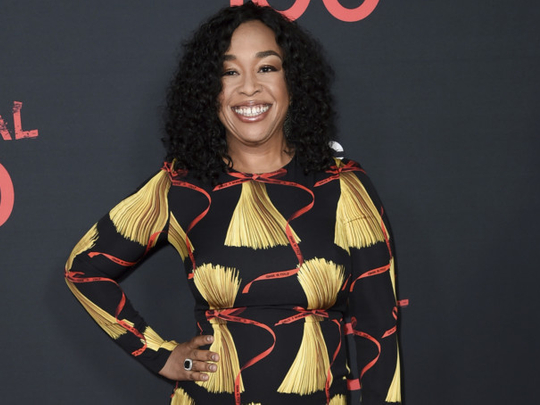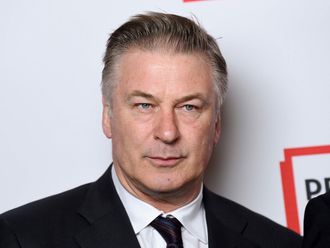
The ABC network three years ago handed its most lucrative night of the week — Thursday — to its most prolific producer, Shonda Rhimes. ABC grouped three Rhimes-produced shows together and promoted the bloc as Thank God It’s Thursday.
The network has long thanked its lucky stars for Rhimes, who rose to prominence in 2005 with her breakout hit Grey’s Anatomy. She followed up with Scandal, Private Practice and How to Get Away with Murder, helping create a female-friendly vibe that distinguished ABC from other networks.
So Netflix’s announcement late Sunday that Rhimes would be moving her Shondaland production company to the streaming service was a gut punch to ABC. The network has raked in hundreds of millions of dollars over the years in advertising revenue and foreign distribution fees from the sale of Rhimes’ shows.
ABC on Monday sought to contain the damage, noting it would not be losing Grey’s Anatomy and other shows that made Rhimes famous. The existing shows will remain on ABC.
“With the launch of a new season upon us, fans can rest assured that TGIT remains intact and will be as buzzed about as ever,” Channing Dungey, ABC’s entertainment president, said in a statement referencing the Thursday block.
But the loss of ABC’s most prominent writer-executive producer, known in the TV industry as a show runner, comes at an inopportune time for Walt Disney Co. Its television networks have been struggling to contain costs at a time when viewers were already fleeing in droves for services such as Netflix, Hulu and Amazon.com.
Rhimes, in a statement, said she decided to leave ABC for Netflix because the streaming service offered “unique creative freedom and instantaneous global reach.”
The high-profile move could have ramifications beyond ABC. Senior executives at other networks said they recognised that they would have to spend more to hold on to their top-tier talent.
“This comes at an incredibly challenging time with more competition for everyone,” said one television network executive who was not authorised to speak publicly. “Netflix is buying their way into the television space.”
Another senior executive at a competing network conceded: “We will have to spend more for top talent.”
Increasingly, the landscape is becoming one of haves and have-nots. Netflix is pouring unprecedented sums of money — about $6 billion (Dh22.03 billion) this year — into original content to take viewers away from established behemoths, including Disney, 21st Century Fox, NBCUniversal and CBS Corp.
Amazon.com has deep pockets, too, and it has been building up its Prime video service to keep more consumers in its online retail store. The prolific spending by the digital companies has put broadcast networks and cable channels on the defensive, while giving consumers an abundance of entertainment options.
The race for viewers has resulted in the production of more than 450 television shows this year, a gold rush that John Landgraf, chief executive of FX Networks, has labelled “peak TV.”
“We are all watching an epic battle unfold for who will control human attention, which is both a finite resource and the most economically valuable commodity on Earth,” Landgraf told reporters last week at the Television Critics Association press tour in Beverly Hills.
“It’s creating the exhilarating race to the top as seen in the competition to create ever higher quality television programs, but it is also creating a glut of content and the depressing race to the bottom in the dissemination of... endless volumes of relative mediocrity,” Landgraf said.
The stakes are high for the upcoming TV season because advertisers this year have agreed to pay more money for television’s commercial time. Broadcast and cable TV networks generated an estimated $19.7 billion in advertising time sold in the so-called upfront ad market, which wrapped up in July, according to Media Dynamics Inc. That represents a nearly 6 per cent increase over the amount sold in the 2016 upfront ad auction.
The broadcast TV networks sold approximately $9.1 billion of time, an increase of 4 per cent over the previous year.
Analysts and talent agents said that TV creators are increasingly drawn to the flexibility that Netflix and other digital players now offer. Among the pluses are shorter seasons, more accommodating production schedules and global distribution.
“Some talent is going to prefer this type of format,” said Robin Diedrich, an Edward Jones Research analyst. “It is an increasing risk for the broadcast networks overall, not just ABC.”
For ABC, Rhimes’ move eventually could be costly. Disney’s media networks unit, which includes ESPN and ABC, has been a trouble spot for the Burbank company over the last few years, recording a quarterly decline in operating income on a year-over-year basis for five quarters in a row. For the most recent quarter, which ended on July 1, Disney’s television unit had operating income of $1.84 billion, which was down 22 per cent from a year earlier.
Within the media networks unit, the broadcast TV division, which houses ABC, has been an inconsistent performer over the same period, posting year-over-year operating income declines in four of the last eight quarters. For the quarter that ended July 1, the division’s operating income dropped 22 per cent to $253 million, a decline that Disney partly attributed to lower advertising revenue, reflecting the diminished ratings at ABC.
ABC finished in fourth place in the 2016-17 television season, behind NBC, CBS and Fox, in the 18-to-49-year-old demographic coveted by advertisers.
The loss of Rhimes also is a setback for ABC’s entertainment chief, Dungey, who worked closely with Rhimes for nearly a decade. When Dungey was named president of ABC Entertainment last year, the network credited her ability to foster relationships with stars such as Rhimes, calling Dungey “a proven magnet for top creative talent.”
Diedrich, the analyst, said Rhimes’ departure would hurt.
“She has been a strong source of a number of shows,” said Diedrich, who covers Disney. “I think it is definitely a dent in (ABC’s) plans in taking away a big talent like Shonda Rhimes.”
ABC, of course, is still a powerful force, drawing more than 6 million viewers a night in prime time. Diedrich noted that the network, in recent years, has demonstrated an ability to retain and cultivate talent, and would remain a desirable home for creators.
“They still have huge household reach,” she said. “There is still a huge draw for talent to want to go to ABC.”
Networks are trying to adjust to changes in the marketplace, relaxing long-held practices with the aim of recruiting creators and actors who do not want to commit to 22-episode seasons. For example, ABC has high hopes for its thriller “Ten Days in the Valley,” starring Kyra Sedgwick, which will unfold in 10 episodes this fall.
Netflix’s recruitment of Rhimes comes less than a week after Disney unveiled its plan to launch two new video streaming offerings over the next two years. One of those products, an unnamed Disney-branded service scheduled to unfurl in 2019, would include films and TV shows. The other would be for ESPN.
Jason Moser, an analyst at Motley Fool who covers Disney, said the Burbank company’s streaming ambitions are an obvious “pivot in the direction of becoming more like Netflix, more like Amazon.”
“For Disney, it is an interesting battle,” he said.












